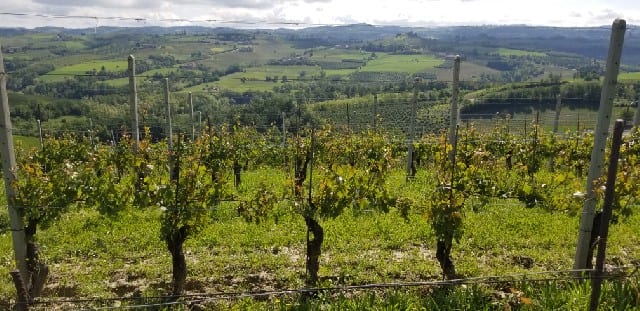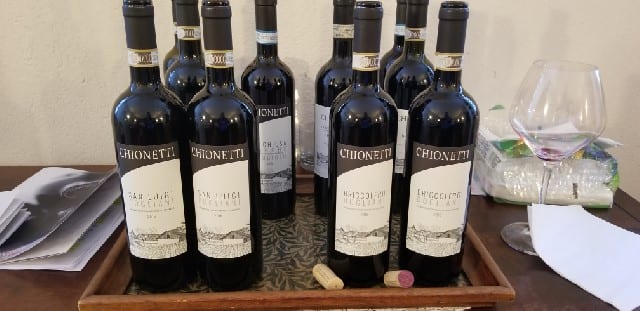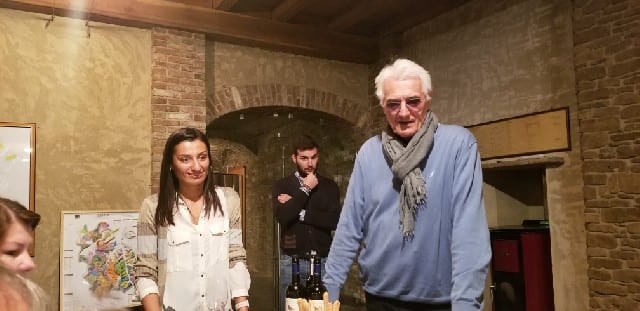
12 Jul Dolcetto Reigns in Dogliani DOCG
Piemonte is a region famous for Barolo and Barbaresco. But, Nebbiolo, while the king of the grapes, is not the only grape of Piemonte. Dolcetto is an important grape that many times is underestimated as a simple, uninteresting, wine. Well, it is not! And, when it is from Dogliani, a town in the heart of Piemonte, it is definitely worth being noticed! Dolcetto definitely reigns in Dogliani and you can read my story in the Napa Valley Register.
When it comes to Piemonte, Italy, Nebbiolo is king. However, in Dogliani, a small town in the heart of the Langhe in Piemonte, the best vineyards are planted to Dolcetto.
Do not be mistaken. Dolcetto is neither sweet or too light of a red wine. Dolcetto is a black wine grape widely grown in Piemonte that produces a wine that can be tannic and fruity and is almost always dry.
While the name, “dolcetto,” means “little sweet one,” it is not named this because of the sugar levels or the taste of the wine. The name is derived from the hills where it is grown. While in English we would call the hills “soft, rolling hills,” the Italians call them “coline dolce,” which translates to “sweet hills.”
Dolcetto is grown throughout Piemonte, and its history dates back to the Medieval era, with documents from 1596 marking the vinification of Dolcetto (dozzetto).
Established as Dolcetto di Dogliani DOC in 1974 and then Dogliani DOCG in 2005, Dogliani DOCG is an area that covers more than 2,400 acres. The terroir is perfect for Dolcetto as Dogliani sits at a high altitude of more than 1,300 feet. Dolcetto ripens in the warmer season and is typically first to pick but being at a higher altitude, the grapes have a slower maturation rate.
Dogliani DOCG produces a wine that is bolder than Dolcetto d’Alba and Dolcetto d’Asti and should not be overlooked or underestimated. When I visited the region, I was really impressed by the intensity and elegance of the wine and by how enjoyable they are to drink. Here are two of the wineries I visited:
Chionetti
Standing in the vineyards of Chionetti in the southern part of Piemonte, you can see the Alps to the north. Chionetti was founded in 1912 by Giuseppe Chionetti and continued by his son, Quinto. Quinto’s son, Andrea, took over and focused on the potential of their vineyards, producing three single vineyard wines, until he unexpectedly died in a car accident in 1988. Quinto continued to run the winery and was joined by Andrea’s wife Maria in 1999. Quinto’s grandson, Nicola, took over the winery in 2013.
Chionetti has 34.5 acres of vines and is 100 percent certified organic in the vineyard. The vines are Guyot-trained and low to the ground and planted in clay soils. Due to the elevation, the grapes have a longer maturation which results in wines with better acidity, more balance and elegance and with the potential to age longer. The grapes are fermented naturally, and the wines are not filtered.
Chionetti San Luigi Dogliani 2016 – Made in stainless steel, this Dolcetto is produced in the simplest, fruit-driven style. Released one year after harvest, it has notes of red forest fruit and wild red fruit, medium tannins and medium plus acidity.
Chionetti La Costa Dogliani DOCG 2015 – The Dolcetto comes from a 60-plus year-old vineyard located on the top of the hill. Fermented in cement and then placed in large oak barrels for two years, the wine is a violet color with notes of darker fruits and a touch of herbal notes and soft tannins.
Chionetti Briccolero Dogliani DOCG 2016 – The Briccolero vineyard faces southeast. The wine is aged in cement tanks, and 10-15 percent in large oak barrels, for one year. The wine has aromas of blackberry, black raspberry, spices and white pepper with balanced tannins and acidity.
Chionetti Briccolero Dogliani DOCG 2013—Dolcetto has a 20-year aging potential. With five years of age, the wine has aromas of bramble, dark red and black fruit, small forest cherries, cooking spices and menthol. The acidity is still lively, and the tannins are softer. The wine has a mineral finish with notes of pine trees.
Chionetti Briccolero Dogliani DOCG 2008 – With 10 years of age, this wine has developed more menthol, mineral, forest green and wild berry aromas. The soft tannins hit back sides of the mouth.
Azienda Agricola Abbona
Started as a traditional farm winery in 1900 by Celso Abbona, lovingly known as Papà Celso, it was in the mid-1960s when his sons Marziano and Enrico Abbona transformed it into a commercial winery. Today, Marziano runs the winery with his two daughters, Mara and Chiara.
The family has 128 acres in three territories including Monforte d’Alba and Novello. But the heart of Abbona’s vineyards is located in Dogliani. At an altitude of more than 1,300 feet and with some Dolcetto vines between 50-70 years old, the Abbona family is converting to organics.
The Abbona family said it believes in the Dolcetto grape and its potential. “We have had to fight to make it known outside of this country,” explained Chiara Abbona. “Too often, it is thought of as a simple wine but Dolcetto shows great aging potential.”
Marziano Abbona San Luigi Dogliani DOCG – This Dolcetto is produced from grapes grown in vineyards located in San Luigi. The wine is naturally fermented and aged in stainless steel for six months. The 2017 is a ruby red color with purple hues. It has a rich fruity and floral nose and balanced tannins.
Abbona Papá Celso 2016 Dogliani DOCG – This wine is the dedicated to the memory of Celso Abbona. The grapes come from the Doriolo vineyard that was planted by Celso Abbona and the vines are over 60 years old. The wine is concentrated with fruit and floral notes with elegant tannins and spice on the finish.
Read the original story in the Napa Valley Register.
Discover more from Please The Palate
Subscribe to get the latest posts sent to your email.







